- Home
- Stephen R. Donaldson
Thomas Covenant 01: Lord Foul's Bane Page 5
Thomas Covenant 01: Lord Foul's Bane Read online
Page 5
Opposite him, across a gap of open air beyond the wall, stood a mountain. It rose hugely from cliffs level with his perch to a sun-bright peak still tipped with snow high above him, and its craggy sides filled nearly half the slab’s horizons. His first impression was one of proximity, but an instant later he realized that the cliff was at least a stone’s throw away from him.
Facing squarely toward the mountain, there was a gap in the wall. The low, scrambling sound seemed to come from this gap.
He wanted to go across the slab, look for the source of the noise. But his heart was laboring too hard; he could not move. He was afraid of what he might see.
The sound came closer. Before he could react, a girl thrust her head and shoulders up into the gap, braced her arms on the stone. When she caught sight of him, she stopped to return his stare.
Her long full hair—brown with flashes of pale honey scattered through it—blew about her on the breeze; her skin was deeply shaded with tan, and the dark blue fabric of her dress had a pattern of white leaves woven into the shoulders. She was panting and flushed as if she had just finished a long climb, but she met Covenant’s gaze with frank wonder and interest.
She did not look any older than sixteen.
The openness of her scrutiny only tightened his distress. He glared at her as if she were an apparition.
After a moment’s hesitation, she panted, “Are you well?” Then her words began to hurry with excitement. “I did not know whether to come myself or to seek help. From the hills, I saw a gray cloud over Kevin’s Watch, and within it there seemed to be a battle. I saw you stand and fall. I did not know what to do. Then I thought, better a small help soon than a large help late. So I came.” She stopped herself, then asked again, “Are you well?”
Well?
He had been hit—!
His hands were only scraped, bruised, as if he had used them to absorb his fall. There was a low ache of impact in his head. But his clothing showed no damage, no sign that he had been struck and sent skidding over the pavement.
He jabbed his chest with numb fingers, jabbed his abdomen and legs, but no sharp pain answered his probing. He seemed essentially uninjured.
But that car must have hit him somewhere.
Well?
He stared at the girl as if the word had no meaning.
Faced with his silence, she gathered her courage and climbed up through the gap to stand before him against the background of the mountain. He saw that she wore a dark blue shift like a long tunic, with a white cord knotted at the waist. On her feet she had sandals which tied around her ankles. She was slim, delicately figured; and her fine eyes were wide with apprehension, uncertainty, eagerness. She took two steps toward him as if he were a figure of peril, then knelt to look more closely at his aghast incomprehension.
What the bloody hell is this?
Carefully, respectfully, she asked, “How may I aid you? You are a stranger to the Land—that I see. You have fought an ill cloud. Command me.” His silence seemed to daunt her. She dropped her eyes. “Will you not speak?”
What’s happening to me?
The next instant, she gasped with excitement, pointed in awe at his right hand. “Halfhand! Do legends live again?” Wonder lit her face. “Berek Halfhand!” she breathed. “Is it true?”
Berek? At first, he could not remember where he had heard that name before. Then it came back to him. Berek! In cold panic he realized that the nightmare was not over, that this girl and Lord Foul the Despiser were both part of the same experience.
Again he saw darkness crouching behind the brilliant blue sky. It loomed over him, beat toward his head like vulture wings.
Where—?
Awkwardly, as if his joints were half frozen with dread, he lurched to his feet.
At once, an immense panorama sprang into view below him, attacked his sight like a bludgeon of exhilaration and horror. He was on a stone platform four thousand feet or more above the earth. Birds glided and wheeled under his perch. The air was as clean and clear as crystal, and through it the great sweep of the landscape seemed immeasurably huge, so that his eyes ached with trying to see it all. Hills stretched away directly under him; plains unrolled toward the horizons on both sides; a river angled silver in the sunlight out of the hills on his left. All was luminous with spring, as if it had just been born in that morning’s dew.
Bloody hell!
The giddy height staggered him. Vulture wings of darkness beat at his head. Vertigo whirled up at him, made the earth veer.
He did not know where he was. He had never seen this before. How had he come here? He had been hit by a police car, and Foul had brought him here. Foul had brought him here?
Brought me here?
Uninjured?
He reeled in terror toward the girl and the mountain. Three dizzy steps took him to the gap in the parapet. There he saw that he was on the tip of a slim splinter of stone—at least five hundred feet long—that pointed obliquely up from the base of the cliff like a rigid finger accusing the sky. Stairs had been cut into the upper surface of the shaft, but it was as steep as a ladder.
For one spinning instant, he thought dumbly, I’ve got to get out of here. None of this is happening to me.
Then the whole insanity of the situation recoiled on him, struck at him out of the vertiginous air like the claws of a condor. He stumbled; the maw of the fall gaped below him. He started to scream silently:
No!!
As he pitched forward, the girl caught his arm, heaved at him. He swung and toppled to the stone within the parapet, pulled his knees up against his chest, covered his head.
Insane! he cried as if he were gibbering.
Darkness writhed like nausea inside his skull. Visions of madness burned across his mindscape.
How?
Impossible!
He had been crossing the street. He insisted upon that desperately. The light had been green.
Where?
He had been hit by a police car.
Impossible!
It had aimed itself straight for his heart, and it had hit him.
And not injured him?!
Mad. I’m going mad mad mad.
And not injured him?
Nightmare. None of this is happening, is happening, is happening.
Through the wild whirl of his misery, another hand suddenly clasped his. The grip was hard, urgent; it caught him like an anchor.
Nightmare! I’m dreaming. Dreaming!
The thought flared through his panic like a revelation. Dreaming! Of course he was dreaming. Juggling furiously, he put the pieces together. He had been hit by a police car—knocked unconscious. Concussion. He might be out for hours—days. And while he was out, he was having this dream.
That was the answer. He clutched it as if it were the girl’s grip on his straining hand. It steadied him against his vertigo, simplified his fear. But it was not enough. The darkness still swarmed at him as if he were carrion Foul had left behind.
How?
Where do you get dreams like this?
He could not bear to think about it; he would go mad. He fled from it as if it had already started to gnaw on his bones.
Don’t think about it. Don’t try to understand. Madness—madness is the only danger. Survive! Get going. Do something. Don’t look back.
He forced his eyes open; and as he focused on the sunlight, the darkness receded, dropped away into the background and came hovering slowly behind him as if it were waiting for him to turn and face it, fall prey to it.
The girl was kneeling beside him. She had his maimed right hand clamped in both of hers, and concern stood like tears in her eyes. “Berek,” she murmured painfully as he met her gaze, “oh, Berek. What ill assails you? I know not what to do.”
She had already done enough—helped him to master himself, resist the pull of the dangerous questions he could not answer. But his fingers were numb; parts of her clasp on his hand he could not feel at all. He dredged himself into
a sitting position, though the exertion made him feel faint. “I’m a leper,” he said weakly. “Don’t touch me.”
Hesitantly she loosened her grip, as if she were not sure he meant what he said, not sure he knew what he was saying.
With an effort that seemed harsh because of his weakness, he withdrew his hand.
She caught her lower lip between her teeth in chagrin. As if she feared she had offended him, she moved back and sat down against the opposite wall.
But he could see that she was consumed with interest in him. She could not remain silent long. After a moment, she asked softly, “Is it wrong to touch you? I meant no harm. You are Berek Halfhand, the Lord-Fatherer. An ill I could not see assailed you. How could I bear to see you tormented so?”
“I’m a leper,” he repeated, trying to conserve his strength. But her expression told him that the word conveyed nothing to her. “I’m sick—I have a disease. You don’t know the danger.”
“If I touch you, will I become—‘sick’?”
“Who knows?” Then, because he could hardly believe the evidence of his eyes and ears, he asked, “Don’t you know what leprosy is?”
“No,” she answered with a return of her earlier wonder. “No.” She shook her head, and her hair swung lightly about her face. “But I am not afraid.”
“Be afraid!” he rasped. The girl’s ignorance or innocence made him vehement. Behind her words, he heard wings beating like violence. “It’s a disease that gnaws at you. It gnaws at you until your fingers and toes and hands and feet and arms and legs turn rotten and fall off. It makes you blind and ugly.”
“May it be healed? Perhaps the Lords—”
“There’s no cure.”
He wanted to go on, to spit out some of the bitterness Foul had left in him. But he was too drained to sustain anger. He needed to rest and think, explore the implications of his dilemma.
“Then how may I aid you? I know not what to do. You are Berek Ha—”
“I’m not,” he sighed. The girl started, and into her surprise he repeated, “I’m not.”
“Then who? You have the omen of the hand, for the legends say that Berek Earthfriend may come again. Are you a Lord?”
With a tired gesture he held her question at bay. He needed to think. But when he closed his eyes, leaned his head back against the parapet, he felt fear crowding up in him. He had to move, go forward—flee along the path of the dream.
He pulled his gaze back into focus on the girl’s face. For the first time, he noticed that she was pretty. Even her awe, the way she hung on his words, was pretty. And she had no fear of lepers.
After a last instant of hesitation, he said, “I’m Thomas Covenant.”
“Thomas Covenant?” His name sounded ungainly in her mouth. “It is a strange name—a strange name to match your strange apparel. Thomas Covenant.” She inclined her head in a slow bow to him.
Strange, he thought softly. The strangeness was mutual. He still had no conception of what he would have to deal with in this dream. He would have to find out where he stood. Following the girl’s lead, he asked, “Who are you?”
“I am Lena,” she replied formally, “daughter of Atiaran. My father is Trell, Gravelingas of the rhadhamaerl. Our home is in Mithil Stonedown. Have you been to our Stonedown?”
“No.” He was tempted to ask her what a Stonedown was, but he had a more important question in mind. “Where—” The word caught in his throat as if it were a dangerous concession to darkness. “Where are we?”
“We are upon Kevin’s Watch.” Springing lightly to her feet, she stretched her arms to the earth and the sky. “Behold.”
Gritting his resolve, Covenant turned and knelt against the parapet. With his chest braced on the rim, he forced himself to look.
“This is the Land,” Lena said joyfully, as if the outspread earth had a power to thrill her. “It reaches far beyond seeing to the north, west, and east, though the old songs say that High Lord Kevin stood here and saw the whole of the Land and all its people. So this place is named Kevin’s Watch. Is it possible that you do not know this?”
Despite the coolness of the breeze, Covenant was sweating. Vertigo knuckled his temples, and only the hard edge of the stone against his heart kept it under control. “I don’t know anything,” he groaned into the open fall.
Lena glanced at him anxiously, then after a moment turned back to the Land. Pointing with one slim arm to the northwest, she said, “There is the Mithil River. Our Stonedown stands beside it, but hidden behind this mountain. It flows from the Southron Range behind us to join the Black River. That is the northern bound of the South Plains, where the soil is not generous and few people live. There are only five Stonedowns in the South Plains. But in this north-going line of hills live some Woodhelvennin.
“East of the hills are the Plains of Ra.” Her voice sparkled as she went on: “That is the home of the wild free horses, the Ranyhyn, and their tenders the Ramen. For fifty leagues across the Plains they gallop, and serve none that they do not themselves choose.
“Ah, Thomas Covenant,” she sighed, “it is my dream to see those horses. Most of my people are too content—they do not travel, and have not seen so much as a Woodhelven. But I wish to walk the Plains of Ra, and see the horses galloping.”
After a long pause, she resumed: “These mountains are the Southron Range. Behind them are the Wastes, and the Gray Desert. No life or passage is there; all the Land is north and west and east from us. And we stand on Kevin’s Watch, where the highest of the Old Lords stood at the last battle, before the coming of the Desolation. Our people remember that, and avoid the Watch as a place of ill omen. But Atiaran my mother brought me here to teach me of the Land. And in two years I will be old enough to attend the Loresraat and learn for myself, as my mother did. Do you know,” she said proudly, “my mother has studied with the Lorewardens?” She looked at Covenant as if she expected him to be impressed. But then her eyes fell, and she murmured, “But you are a Lord, and know all these things. You listen to my talk so that you may laugh at my ignorance.”
Under the spell of her voice, and the pressure of his vertigo, he had a momentary vision of what the Land must have looked like after Kevin had unleashed the Ritual of Desecration. Behind the luminous morning, he saw hills ripped barren, soil blasted, rank water trickling through vile fens in the riverbed, and over it all a thick gloom of silence—no birds, no insects, no animals, no people, nothing living to raise one leaf or hum or growl or finger against the damage. Then sweat ran into his eyes, blurred them like tears. He pulled away from the view and seated himself again with his back to the wall. “No,” he murmured to Lena, thinking, You don’t understand. “I did all my laughing—long ago.”
Now he seemed to see the way to go forward, to flee the dark madness which hovered over him. In that brief vision of Desolation, he found the path of the dream. Skipping transitions so that he would not have to ask or answer certain questions, he said, “I’ve got to go to the Council of Lords.”
He saw in her face that she wanted to ask him why. But she seemed to feel that it was not her place to question his purpose. His mention of the Council only verified his stature in her eyes. She moved toward the stair. “Come,” she said. “We must go to the Stonedown. There a way will be found to take you to Revelstone.” She looked as if she wanted to go with him.
But the thought of the stair hurt him. How could he negotiate that descent? He could not so much as look over the parapet without dizziness. When Lena repeated, “Come,” he shook his head. He lacked the courage. Yet he had to keep himself active somehow. To Lena’s puzzlement, he said, “How long ago was this Desolation?”
“I do not know,” she replied soberly. “But the people of the South Plains came back across the mountains from the bare Wastes twelve generations past. And it is said that they were forewarned by High Lord Kevin—they escaped, and lived in exile in the wilderness by nail and tooth and rhadhamaerl lore for five hundred years. It is a legacy we
do not forget. At fifteen, each of us takes the Oath of Peace, and we live for the life and beauty of the Land.”
He hardly heard her; he was not specifically interested in what she said. But he needed the sound of her voice to steady him while he searched himself for strength. With an effort, he found another question he could ask. Breathing deeply, he said, “What were you doing in the mountains—why were you up where you could see me here?”
“I was stone-questing,” she answered. “I am learning suru-pa-maerl. Do you know this craft?”
“No,” he said between breaths. “Tell me.”
“It is a craft I am learning from Acence my mother’s sister, and she learned it from Tomal, the best Craftmaster in the memory of our Stonedown. He also studied for a time in the Loresraat. But suru-pa-maerl is a craft of making images from stones without binding or shaping. I walk the hills and search out the shapes of rocks and pebbles. And when I discover a form that I understand, I take it home and find a place for it, balancing or interlocking with other forms until a new form is made.
“Sometimes, when I am very brave, I smooth a roughness to make the joining of the stones steadier. In this way, I remake the broken secrets of the Earth, and give beauty to the people.”
Vaguely Covenant murmured, “It must be hard—think of a shape and then find the rocks to fit it.”
“That is not the way. I look at the stones, and seek for the shapes that are already in them. I do not ask the Earth to give me a horse. The craft is in learning to see what it is the Earth chooses to offer. Perhaps it will be a horse.”
“I would like to see your work.” Covenant paid no attention to what he was saying. The stairs beckoned him like the seductive face of forgetfulness, in which lepers lost their self-protective disciplines, their hands and feet, their lives.
But he was dreaming. The way to endure a dream was to flow with it until it ended. He had to make that descent in order to survive. That need outweighed all other considerations.
Abruptly, convulsively, he hauled himself to his feet. Planting himself squarely in the center of the circle, he ignored the mountain and the sky, ignored the long fall below him, and gave himself a thorough examination. Trembling, he probed his still-living nerves for aches or twinges, scanned his clothing for snags, rents, inspected his numb hands.

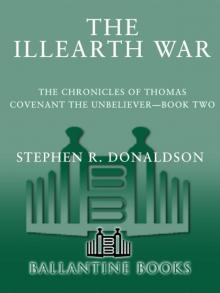 The Illearth War
The Illearth War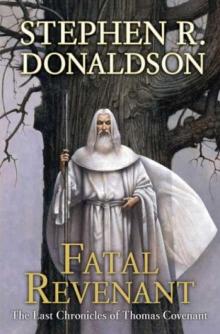 Last Chronicles of Thomas Covenant 02 - Fatal Revenant
Last Chronicles of Thomas Covenant 02 - Fatal Revenant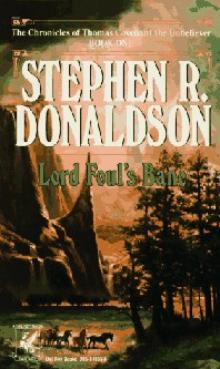 Lord Foul's Bane
Lord Foul's Bane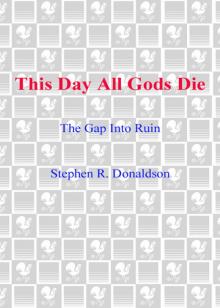 The Gap Into Ruin: This Day All Gods Die
The Gap Into Ruin: This Day All Gods Die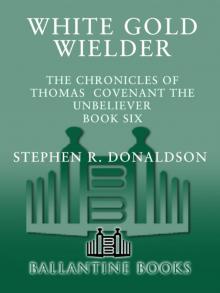 White Gold Wielder
White Gold Wielder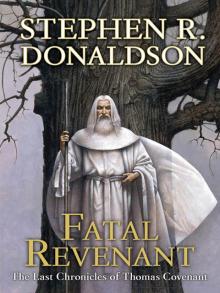 Fatal Revenant
Fatal Revenant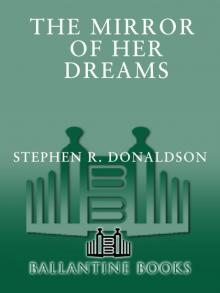 The Mirror of Her Dreams
The Mirror of Her Dreams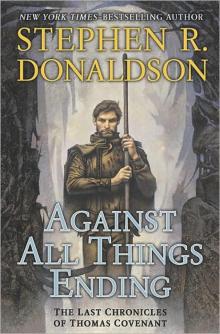 Against All Things Ending
Against All Things Ending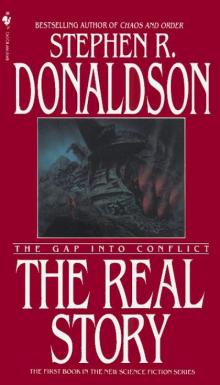 The Real Story: The Gap Into Conflict
The Real Story: The Gap Into Conflict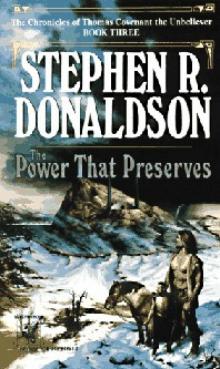 The Power That Preserves
The Power That Preserves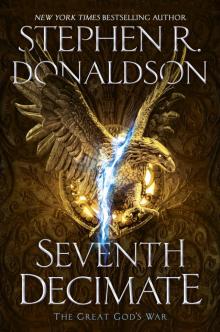 Seventh Decimate
Seventh Decimate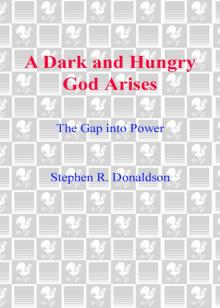 The Gap Into Power: A Dark and Hungry God Arises
The Gap Into Power: A Dark and Hungry God Arises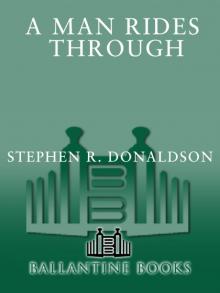 A Man Rides Through
A Man Rides Through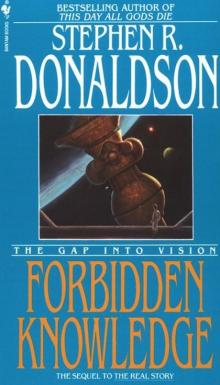 The Gap Into Vision: Forbidden Knowledge
The Gap Into Vision: Forbidden Knowledge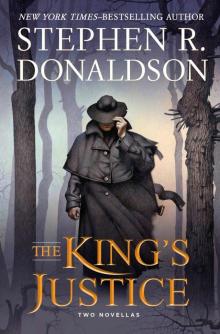 The King's Justice: Two Novellas
The King's Justice: Two Novellas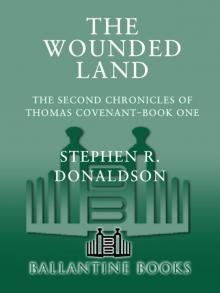 The Wounded Land
The Wounded Land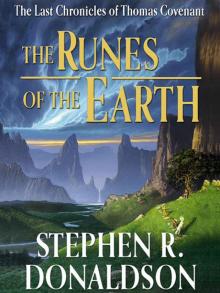 The Runes of the Earth
The Runes of the Earth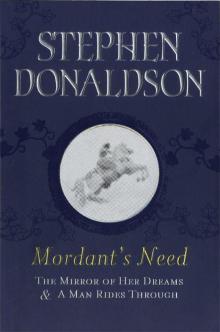 Mordant's Need
Mordant's Need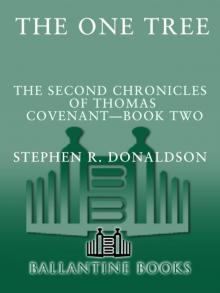 The One Tree
The One Tree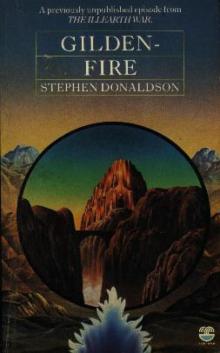 Gilden-Fire
Gilden-Fire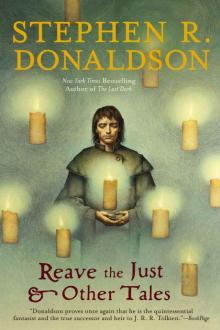 Reave the Just and Other Tales
Reave the Just and Other Tales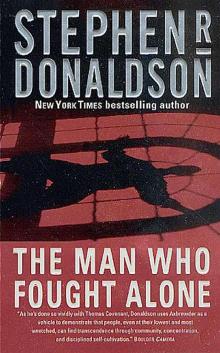 The Man Who Fought Alone
The Man Who Fought Alone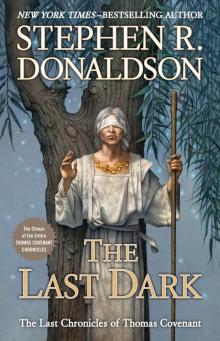 The Last Dark
The Last Dark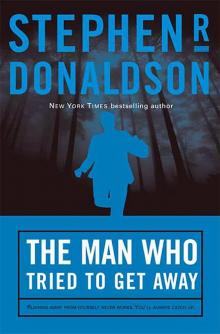 The Man Who Tried to Get Away
The Man Who Tried to Get Away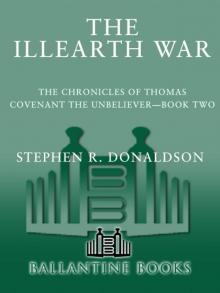 Thomas Covenant 02: The Illearth War
Thomas Covenant 02: The Illearth War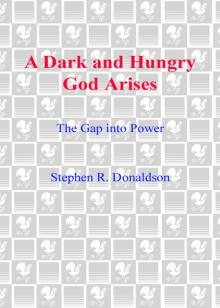 A Dark and Hungry God Arises
A Dark and Hungry God Arises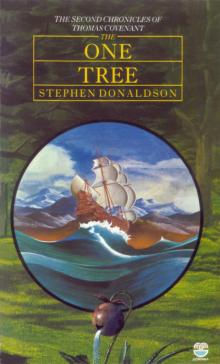 The One Tree t2cotc-2
The One Tree t2cotc-2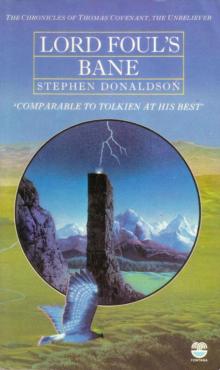 Lord Foul's Bane cotc-1
Lord Foul's Bane cotc-1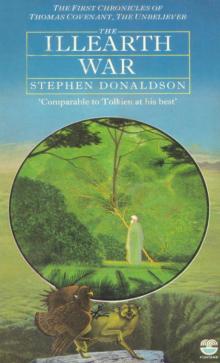 The Illearth War t1cotc-2
The Illearth War t1cotc-2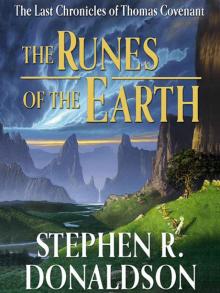 The Runes of the Earth: The Last Chronicles of Thomas Covenant - Book One
The Runes of the Earth: The Last Chronicles of Thomas Covenant - Book One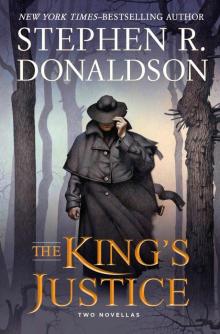 The King's Justice
The King's Justice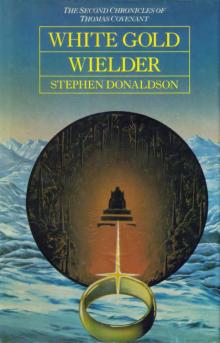 White Gold Wielder t2cotc-3
White Gold Wielder t2cotc-3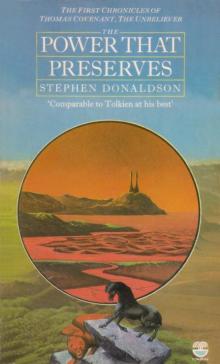 The Power That Preserves t1cotc-3
The Power That Preserves t1cotc-3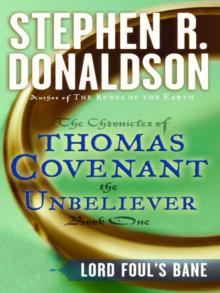 Thomas Covenant 01: Lord Foul's Bane
Thomas Covenant 01: Lord Foul's Bane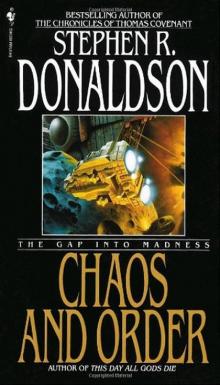 Chaos and Order: The Gap Into Madness
Chaos and Order: The Gap Into Madness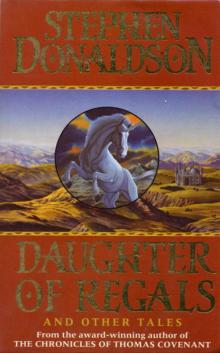 Daughter of Regals
Daughter of Regals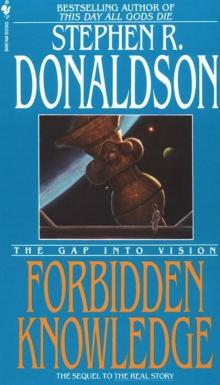 Forbidden Knowledge: The Gap Into Vision
Forbidden Knowledge: The Gap Into Vision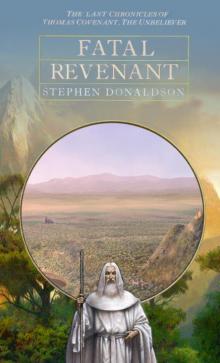 Fatal Revenant t3cotc-2
Fatal Revenant t3cotc-2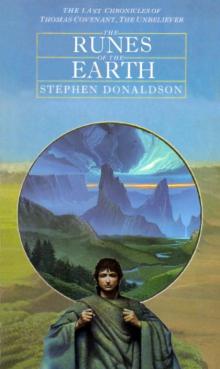 The Runes of the Earth t3cotc-1
The Runes of the Earth t3cotc-1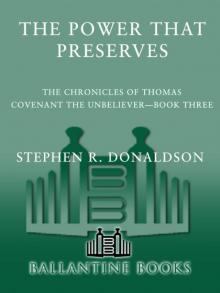 Thomas Covenant 03: Power That Preserves
Thomas Covenant 03: Power That Preserves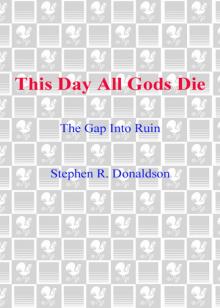 This Day all Gods Die: The Gap into Ruin
This Day all Gods Die: The Gap into Ruin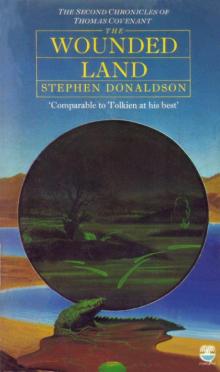 The Wounded Land t2cotc-1
The Wounded Land t2cotc-1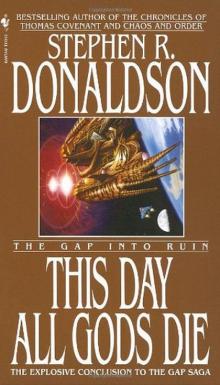 This Day All Gods Die
This Day All Gods Die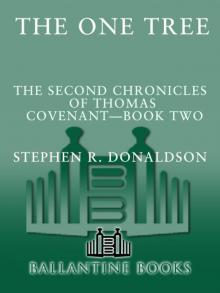 One Tree
One Tree